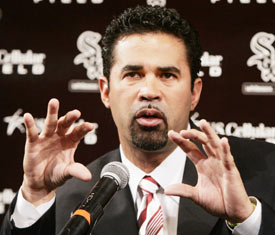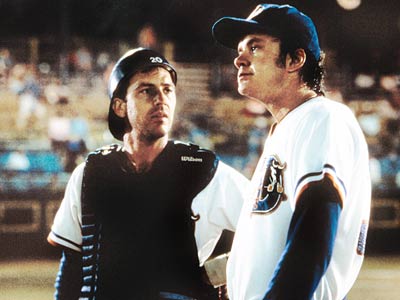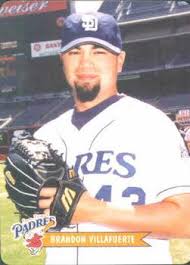Ahead of our next piece for the Internet Baseball Writers Association of America, focusing on the Schaumburg Boomers, we attended yesterday’s 8-5 loss to the Tri-City Valley Cats at Wintrust Field.
We’ll be linking that piece next week when it runs. For now, we flash back to our piece that ran in RedEye in 2009, when we got to sit in the dugout for a game.
Back then, the franchise playing ball in this stadium was known as the Schaumburg Flyers. The new team, known as the Schaumburg Boomers, came along in 2011.
Here it is:
Watching a professional baseball game from the dugout dramatically alters your perception of the sport. The crack of the bat is louder. The smack of ball against mitt is more profound. And the cursing is harsher and more emotionally charged.
My day at Alexian Field (a nice, but small ballpark adjacent to a suburban airport) begins with me shadowing Schaumburg Flyers manager Steve Maddock.
I, along with his seven-year-old son, Tyler, accompany his pre-game rituals.
I’m not the only non-team member in the dugout tonight; as one of the players brought along his friend to join us.
Clichés exist for a reason, and I am taken aback by the players’ chewing and spitting of sunflower seeds.
The moisture from the dugout’s water cooler collects with the spit to make the floor of the dugout a surface that should not be walked upon in open shoes. Then there’s the swearing.
I’ve been in a clubhouse with Ozzie Guillen (and although it seems impossible, he uses even more expletives and is even more politically incorrect off the record), so this language doesn’t phase me.
Mostly, it’s the umpires who are being cursed out.
There’s no crying in baseball, but there is cheerleading. Maybe it’s the start of a larger trend, but the last three ballparks I’ve visited, including this one, have had cheer squads.
When not performing, the dancers sign autographs. I’m not joking, they really do sign autographs.
Their initial appearance now makes them the primary conversation topic, and the players discuss who their favorite squad members are.
This is followed up with more in-depth locker-room talk.
(Note: it wasn’t until seven years after this was written that the phrase “locker room talk” was perverted and destroyed forever by the person pictured below)
This doesn’t shock me either, but these comments are quickly interrupted by more critiques of the umpires. Which are then interspersed with moments of strategy: “Why didn’t you send him on a lefty? You got to run him against a left-hander!”
The Flyers’ leadoff hitter, Demetrius “Meatball” Heath has a physique completely opposite of his nickname’s implications.
The team calls him “Meat,” which reminds me of the best minor league baseball movie ever made, “Bull Durham.”
In that film “Crash” Davis incessantly called “Nuke” Laloosh “Meat.”
Baseball truly utilizes the art of nicknames on a level far superior to the other sports.
It’s like the mafia, fraternity pledge classes or Sawyer on “Lost.”
The best nicknames replace the person’s actual name and then make you wonder why they obtained that moniker.
I’m told that Demetrius used to eat a lot of spaghetti and meatballs as a kid.
“Bull Durham” also featured a scene in which Crash teaches Nuke the proper clichés to use in interviews. I’ve heard these clichés every day in my job, so I truly appreciate that scene and find tonight’s honest cursing quite refreshing in comparison to those bromides.
Brandon Villafuerte had a brief career in “the show.” While serving as the set-up man to San Diego’s Trevor Hoffman, the all-time Major League career saves leader, Villafuerte accumulated three career saves and eight holds in 2002.
“In ’03, I was the starting closer and they kind of overused me a little bit, wore my arm down,” he says.
“I got tendonitis, then things really haven’t been the same until this year.”
I spoke with Villafuerte about working with Hoffman, one of the game’s best closers and the originator of ballpark “closer entrance” music.
“He talked to me about what’s going on in the game, seeing things in hitters, how to pitch guys in certain situations.
“He’s a great guy with a lot of experience and should be in the Hall of Fame some day, so anything he says, I’m all ears.”
The loudest cheerleading in this stadium occurs in the dugout.
“We’re always standing up at the top step, pulling for each other,” says left fielder Christian “Snaves” Snavely, the Northern League’s All-Star MVP.
If you’re not a fan of the team or even of baseball in general, you will be by the end of a night in the dugout.
My spirits soared when the Flyers tied the game in the 7th, and my mood crashed when James Morrison surrendered the game-winning homer in the 10th.
Maybe the real reason I found myself hoping they’d win is because the Flyers take off for each game with “it” on board.
The word replacing “it” depends on your culture, but it’s been called: chutzpah, moxie, guts, heart, soul, cajones or fortitude.
Paul M. Banks is the Founding Editor of The Sports Bank. He’s also the author of “Transatlantic Passage: How the English Premier League Redefined Soccer in America,” and “No, I Can’t Get You Free Tickets: Lessons Learned From a Life in the Sports Media Industry.”
He currently contributes to Ravens Wire, part of the USA Today SMG’s NFL Wire Network and the Internet Baseball Writers Association of America. His past bylines include the New York Daily News, Sports Illustrated, Chicago Tribune and the Washington Times. You can follow him on Linked In and Twitter.










